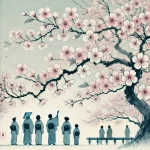ことりのうた [Kotori no Uta]
Words : 与田準一 [YODA Junichi]
Music : 芥川也寸志 [AKUTAGAWA Yasushi]
Let’s learn Japanese with a children’s song. It’s okay even for beginners.
ことりは とっても うたが すき
kotori wa tottemo uta ga suki
- とり [tori] : bird
- とても [totemo] : very
- うた [uta] : song
- すき [suki] : like
(translation) “The little bird likes songs very much.”
“ことり / kotori” refers to a small bird or a young bird. For example,
- とり [tori] : bird
- ことり [kotori] : small bird
- ねこ [neko] : cat
- こねこ [koneko] : kitten
- いぬ [inu] : dog
- こいぬ [koinu] : puppy
When you emphasize “とても / totemo,” it becomes “とっても / tottemo,” similar to how “very” can become “verrrry.”
This is a versatile phrase that can be used in various contexts, so be sure to remember it.

かあさん よぶのも うたで よぶ
kāsan yobu no mo uta de yobu
- かあさん [kāsan] : mother
- よぶ [yobu] : call
(translation) “Even calls its mother with a song.”
There are various ways to say “mother” in Japanese. You can use the polite expression “お / o” to say “おかあさん / okaasan.” Let’s also learn the word for father.
- おかあさん [okāsan] : mother
- おとうさん [otōsan] : father
ぴぴぴぴぴ ちちちちち ぴちくりぴい
pipipipipi chichichichi pichikuri pii
This is an onomatopoeia representing bird sounds. Japanese has many types of onomatopoeia, and enjoying them in this way can make learning fun.

ことりは とっても うたが すき
kotori wa tottemo uta ga suki
とうさん よぶのも うたで よぶ
tōsan yobu no mo uta de yobu
ぴぴぴぴぴ ちちちちち ぴちくりぴい
pipipipipi chichichichi pichikuri pii
(translation) “The little bird likes songs very much.
Even calls its father with a song.
Pipipipipi chichichichi pichikuri pii.”
That’s the end.
From here, some extra notes.
This song, still sung by children today, was actually created in 1954.
The composer Yasushi Akutagawa is a well-known composer, and his father, Ryunosuke Akutagawa, is an even more famous novelist who also wrote many fairy tales. If you’re interested, give them a read.
Next time, I’ll cover “Umi.”
Thanks for reading! Feel free to comment if you have any feedback or questions.
Follow me on X.



